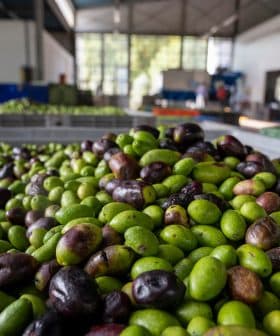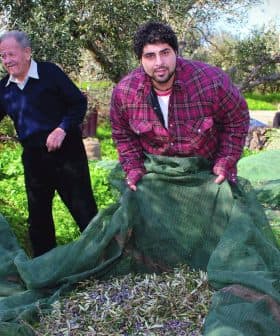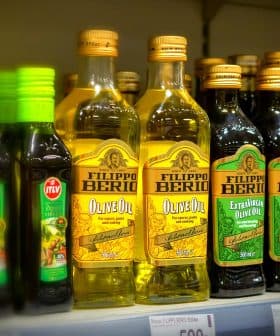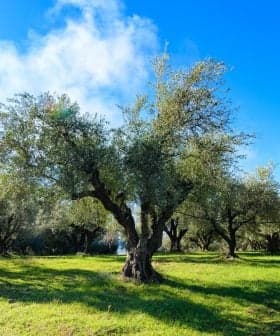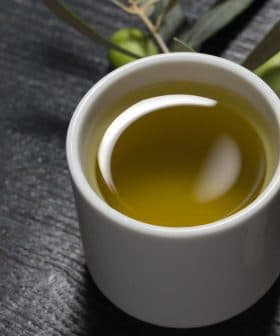Study Finds Olives Grown at Higher Altitudes Yield Better Quality Oils
A study conducted by Jerash University found that oils produced from areas of higher altitude in Jordan had a longer shelf life and higher nutritional values.
 The Jordan Valley
The Jordan Valley 11.1K reads
11.1K readsA study by Jerash University in Jordan found that olives grown at higher elevations produce higher quality oils than those grown at lower elevations, with oils from the Kufranja area having the best quality and longest storage ability. The research showed that climatic conditions, post-harvest procedures, and weather all play a significant role in determining olive oil quality, suggesting that future olive groves should be planted at higher elevations for better quality oils.
A recent study by Jerash University, in Jordan, has found that olives cultivated at higher elevations yield higher quality oils that those cultivated at lower elevations.
The researchers compared oils produced at 750 feet below sea level, in the Jordan Valley, with those produced at 1,600, 2,230 and 2,580 meters above sea level in Al-Subaihi, Kufaranja and Madaba, respectively.
High elevation olive oil, such as that from the Kufranja area, is of good quality and is characterized by long conservation and storage periods as compared with other oils.
Al-Shdiefat and his team looked at the values of 13 different fatty acids from 12 samples, three of which were provided by each of the four regions. The oils used in the study all came from non-irrigated farms, were harvested in early November and stored in the exact same conditions until the study could be done.
What they found was that oils produced from olives grown at higher elevation tended to have higher ratios of unsaturated to saturated fatty acids, especially oleic acid, which is considered the main and most important acid in olive oil composition.
See Also:Olive Oil Research“High elevation olive oil, such as that from the Kufranja area, is of good quality and is characterized by long conservation and storage periods as compared with other oils, thus preserving its physical and chemical properties and high nutritional value,” Saleh Al-Shdiefat, a professor in the department of agriculture at Jerash University, wrote in the study.
The only anomaly in the study was that oils from the slightly lower Kufaranja region (2,230 feet) had higher values of unsaturated fatty acids that the Madaba region (2,580 feet).
“Mainly the climatic conditions, especially temperature, light exposure and precipitation, in addition to the cultural practices and post harvest procedures until pressing in the mills [accounted for this anomaly],” Al-Shdiefat told Olive Oil Times.
In other words, the weather and harvesting practices also have a significant impact in determining olive oil quality, but when the best practices are applied to higher elevation groves and the weather cooperates with growers, the resulting oils are of a higher quality.
Meanwhile, oils produced from olives grown in the Jordan Valley had the lowest ratios of unsaturated to saturated fatty acids, but had the highest levels of linoleic and linolenic fatty acids, which contribute to the flavor of the olives and are preferable in table olives.
“While olive oil produced below sea level, such as in the Jordan Valley area, is the most desirable oil on the table, it has the lowest quality of the four sites, and it is the most vulnerable to oxidation and has low storage ability,” Al-Shdiefat wrote.
Al-Shdiefat said that the findings from his study should be used to determined where future olive groves should be planted and what current groves should be used for, whether it be table olives or the production of olive oils destined for export.
“Taking the output results concerning quality issues into consideration, it is preferable not to plant more olive trees in the Jordan Valley areas,” he said.
Olive cultivation and oil production are the most important agricultural activities in Jordan and provides livelihoods for Jordanian living in rural areas. Roughly 24 percent of Jordan’s arable land is planted with olive trees and the sector has received significant investment both domestically and from abroad over the past decade.
According to the International Olive Council, Jordan produced 24,000 tons of olive oil in the 2018/19 campaign, of which 1,000 tons were exported. The kingdom also produced 30,000 tons of table olives in the campaign, of which 5,000 tons were exported.
“In Jordan, we are looking to improve olive and olive oil quality,” Al-Shdiefat said.
This means finding the best places to plant new olive trees, so that the resulting oils will have the highest possible quality chemical compositions. Based on the results of this study, that means shifting cultivation away from the lower elevations and looking for new places to cultivate olives outside of the west and northeast of the country, where olives have been traditionally grown for millennia.
“This research is the starting point of this issue.” Al-Shdiefat said. “We need to be looking for other elevations more than 1,000 meters [3,280 feet] above sea level that are found in the southern part of Jordan [to see if olives can be grown successfully there].”
The study was published by the Canadian Center of Science and Education.



